Mastering the Art of Dealing Blackjack: A Complete Guide
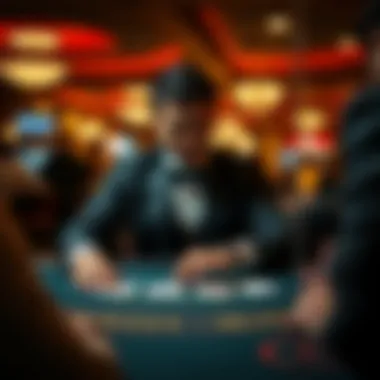
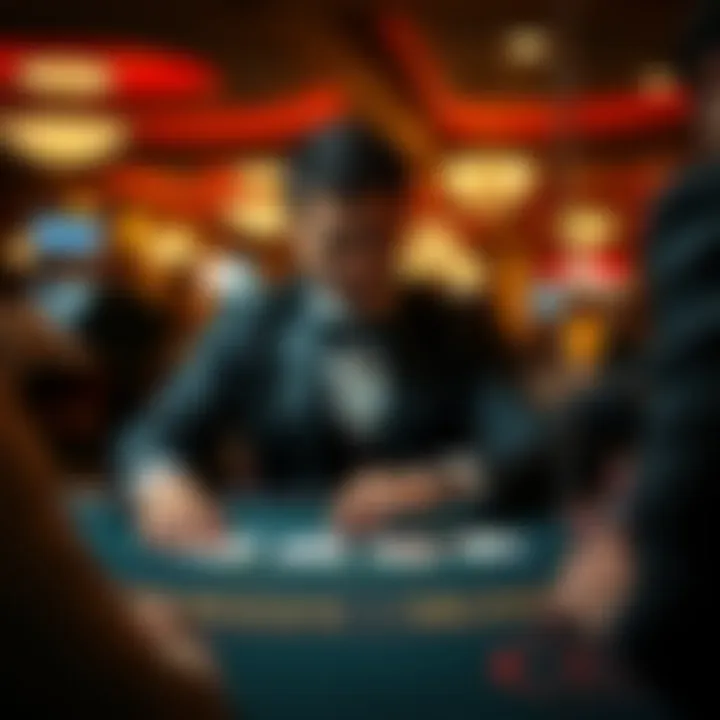
Intro
Dealing blackjack isn't just about shuffling cards and taking bets; there's an artistry involved that can make or break the experience for players and the dealer alike. It's a nuanced game steeped in tradition, strategy, and social interaction. Whether you're a novice standing behind the felt for the first time or a seasoned dealer seeking to polish your craft, understanding the dynamics of blackjack is essential. This guide aims to unravel the complexities of dealing blackjack by examining key strategies, practical tips, and the responsibilities that come with the dealer's role.
Beneath the surface of this classic card game lies a wealth of techniques and approaches to ensure fair play and enhance player satisfaction. From grasping game mechanics to recognizing the subtle signs of players' moods, each element plays a vital part in a successful dealing experience. As we go deeper into the art of dealing, we'll touch on advanced betting methods, setting limits, and the importance of responsible gambling. The goal is to provide you with not just the basics, but a comprehensive understanding of how to thrive in the vibrant environment of a casino.
Each aspect of dealing blackjack carries significance, revealing not only how to handle the cards but also how to navigate the social waters of a blackjack table. Just as a seasoned fisherman knows when to cast his net, a skilled dealer must know when to engage or lay back, ensuring a smooth flow of the game while keeping players invested.
It's a world where every shuffle matters, every interaction counts, and every game unfolds differently. So, let’s shuffle the deck and delve into the strategies that can elevate your dealing game to a whole new level.
Understanding the Gameplay of Blackjack
In the realm of casino games, few are as iconic or as captivating as blackjack. Knowing the ins and outs of the gameplay is crucial for both players and dealers. This section explores the essential elements that make understanding the gameplay so important. By grasping the rules, objectives, and card values, dealers not only enhance their skills but also create an engaging experience for players.
Overview of Blackjack Rules
At the heart of blackjack are its rules, which dictate the flow of the game. One fundamental principle centers around the dealer's role, who must follow specific procedures when dealing the cards. For instance, after players place their bets, the dealer deals two cards to each player and themselves. One of the dealer's cards is face-up, while the other remains hidden, introducing an element of strategy into the game.
Additionally, players have options such as 'Hit' (taking another card), 'Stand' (keeping their current hand), 'Double Down' (doubling their bet for one additional card), and 'Split' (dividing their hand into two separate hands if they hold a pair). Familiarity with these rules ensures that the dealer can facilitate a smooth game and maintain an atmosphere of fairness.
"Understanding and implementing rules correctly can turn the tide of the game, enhancing not only player satisfaction but also the dealer's reputation."
Objective of the Game
The objective of blackjack is straightforward: players aim to have a hand value closer to 21 than the dealer's hand, without exceeding that number. This goal presents a mix of chance and strategy. Dealers must recognize that the game isn't just about the cards dealt; it's about reading the players as well. Understanding the mindset of each participant—be it a cautious player hesitant to hit or a more aggressive risk-taker—can guide the dealer's approach.
A successful dealer recognizes the stakes at play and knows that players appreciate when someone respects the strategy behind the game. Moreover, ensuring that players understand their objectives promotes a more enjoyable environment. If players grasp the aim—beating the dealer while avoiding going bust—they will likely feel more engaged throughout the course of play.
Card Values Explained
Understanding card values is paramount for any dealer. In blackjack, cards from 2 to 10 carry their face value, while Kings, Queens, and Jacks are worth 10. Surprisingly, the Ace can be either 1 or 11, which adds a layer of complexity to hand values.
- 2-10: Face value
- Jack, Queen, King: 10 points
- Ace: 1 or 11 points
A dealer must quickly calculate total values as the game progresses. For instance, if a player has an Ace and a 7, they could have either an 8 or a 18. This flexibility presents tactical choices, affecting how both the dealer and players advance in the game. Having a solid grasp of card values not only aids in the immediate game but also positions the dealer as a knowledgeable authority, encouraging player trust.
In sum, understanding the gameplay of blackjack builds a foundation for effective dealing. By mastering the rules, objectives, and card values, a dealer enhances not only their performance but also the entire gaming experience for players.
Essential Skills for a Blackjack Dealer
In the fast-paced environment of a casino, the role of a blackjack dealer demands a unique blend of skills that are essential for ensuring an enjoyable and fair game. Being a dealer is not just about dealing cards and collecting bets; it’s about striking a balance between professionalism and creating a welcoming atmosphere for players. This section will explore crucial skills that every dealer should master and the benefits these skills bring not only to the dealer but to the entire gaming experience.
Understanding Player Psychology
A dealer’s success often hinges on their understanding of player psychology. Knowing how players think and react can significantly affect the atmosphere at the table. Players range from seasoned professionals, who might be looking for some strategic banter, to novices who may be a bit nervous about placing their bets.
Being attuned to these dynamics allows dealers to cater their interactions appropriately. For instance, a simple question like, "Are you enjoying the game?" can open dialogue with casual players, making them feel more at ease.
- Pay attention to body language:
- Nervous tapping, deep breaths, or smiles can signal how players are feeling.
- Adjust your tone and pace of communication based on these cues.
A proficient dealer will learn to read the room and adapt their approach, fostering trust and enjoyment at the table.
Effective Communication Techniques
Effective communication is another cornerstone of success for a blackjack dealer. Clear and concise explanations help players understand the flow of the game and instill confidence. Miscommunication can lead to confusion and disputes, disrupting the game’s rhythm.
Moreover, using a friendly yet professional tone can enhance the overall experience:
- Practical Techniques:
- Always speak clearly; mumbling can lead to misunderstanding.
- Use player names when possible, as it personalizes the interaction and shows ownership.
- Utilize hand gestures and facial expressions to emphasize points when necessary.
"Good communication is the shorthand of maintaining harmony at the table."
Providng helpful advice on game rules or strategies can also engage players more deeply, allowing for a better gaming experience. When players feel informed, they are more likely to return.
Managing Table Dynamics
Managing table dynamics is perhaps one of the more challenging yet rewarding aspects of being a blackjack dealer. Each table has its own energy, influenced by the players present. A seasoned dealer must learn to create an atmosphere that balances competitiveness with enjoyment.
- Key Strategies:
- Stay neutral and avoid showing bias towards particular players.
- Quickly address any tension or disputes to keep the game flowing.
- Encourage camaraderie among players; a shared joke or a compliment can lighten the mood.
By honing these skills, dealers contribute significantly to the game's atmosphere, often becoming the heartbeat of the table.
In summary, mastering the essential skills of player psychology, effective communication, and table dynamics can elevate a blackjack dealer from merely conducting the game to creating an engaging and enjoyable experience for everyone involved. These skills require careful consideration and practice but yield rich rewards in the form of player satisfaction and table cohesiveness.
Setting Up the Blackjack Table
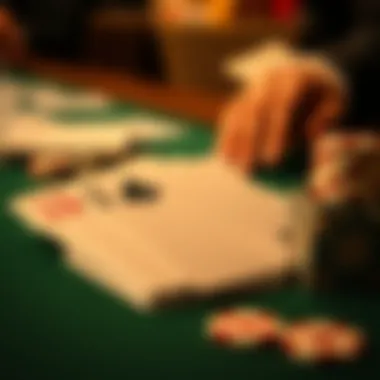

Setting up the blackjack table is not merely a matter of arranging cards and chips; it’s an art form that can greatly influence the flow of the game and the overall experience for everyone involved. From the arrangement of the playing surface to the layout of betting zones, every detail matters. A well-prepared table can foster a lively atmosphere while reducing the chances of confusion that can disrupt gameplay.
Here, we delve into the nuances of setting up the table effectively and why it’s a crucial aspect of the dealer's responsibilities.
Arranging the Playing Surface
Creating a smooth and accessible playing surface is foundational to a successful game of blackjack. The layout should allow for easy navigation around the table, ensuring that players can access their seats and the betting areas without hesitation.
Key considerations include:
- Table Size and Shape: Choose a table that fits comfortably within your space. Traditional blackjack tables are semi-circular, enabling all players to have a clear view of the dealer and the game.
- Clearing Clutter: Keeping the surface free from unnecessary items means fewer distractions. All that’s needed are the essential tools: cards, chips, and a shoe for card dealing.
- Lighting: Adequate lighting can’t be ignored. Bright lights help players see the cards and chips clearly, fostering transparency and helping to maintain trust during the game.
By following these simple yet effective arrangements, the dealer sets the stage for a seamless gaming experience.
Distributing Cards: Techniques and Tips
Distributing cards is where the rubber meets the road in blackjack. It’s not just about flinging cards across the table; the method used can set the tone for the entire game.
- Two Hands, Two Cards: Begin by dealing two cards to each player and two for yourself, making sure to follow standard procedures. Players typically receive their cards face up while the dealer shows only one.
- Controlled Techniques: Use a smooth, controlled motion to deliver cards, ensuring they land neatly in front of each player. Employ a form where you pivot your wrist to add flair without sacrificing accuracy.
- Understanding Player Preferences: Pay attention to how players like their cards dealt. Some prefer a straight delivery, while others might appreciate a slight spin or shuffle.
- Incorporate Table Rules: If the table has specific rules or player preferences, be sure to adapt your technique. Listening to players can not only enhance their experience but also build rapport.
By honing card distribution skills, a dealer elevates the game atmosphere and engages players in a more meaningful way.
Utilizing Chips and Betting Layouts
The chips and betting layouts provide both a visual and functional basis for gameplay. A jumbled spread leads to confusion, while a well-organized layout facilitates smooth transactions and reduces potential disputes.
Essential strategies include:
- Color-Coded Chips: Ensure chips are organized by color, with each color representing a specific value. This allows players to place bets quickly without the wiggling around to find the right denomination.
- Betting Layouts: The betting boxes should be clearly marked. Players should know exactly where to place their bets, minimizing any guessing. Pictorial guides can be considered for novice players.
- Managing Chips Effectively: As a dealer, it’s crucial to handle chips with care. Be ready to make change promptly, and manage the stack sizes so they don’t become unwieldy for players.
- Educating Players: Don’t hesitate to explain the structure of chip values and betting processes, especially to new players. This not only fosters understanding but also cultivates an inviting atmosphere.
Setting up the blackjack table thoughtfully can truly enhance the game’s integrity and the players' enjoyment, transcending mere logistics into the realm of strategic dealer artistry.
"A well-prepared table is half the battle won in creating an engaging and fair gaming experience."
By mindfully addressing these elements, you align yourself as a proficient blackjack dealer, significantly raising the quality of interaction at the table.
Dealing Cards in Blackjack
Understanding the nuances of dealing cards in blackjack is not merely an operational task but a vital skill that can shape the overall gaming experience. The dealer, as a pivotal figure at the table, must ensure a fair play environment while managing the dynamics of the game. Each shuffle, each deal, and every interaction with the players carries weight. It’s an art that marries technique with psychological insight.
Shuffling Techniques
Shuffling is the foundational step in card dealing, essential for ensuring the cards are randomized and fair. There are several techniques that a dealer should master:
- Riffle Shuffle: This involves splitting the deck in two and interleaving the cards. It offers a thorough mix, crucial for maintaining game integrity. However, a dealer must ensure they shuffle smoothly to avoid drawing attention.
- Overhand Shuffle: In this method, you grab a handful of cards from the top and let them fall over your other hand. This is simpler but often less effective in randomization. It's sometimes used for practice or informal play.
- Hindu Shuffle: Commonly seen in many casinos, this method requires the dealer to hold the deck horizontally and let cards fall from one hand to the other. It’s quick and can be made to look fluid with enough practice.
“A good shuffle keeps the players on their toes, making it hard to predict the next card, which is essential in blackjack.”
Each dealer has their preferred method, and it’s wise to experiment to find the technique that feels most natural. Beyond technique, the key is to maintain nimbleness and precision while shuffling, as awkward movements can lead to potential distrust among players.
Dealing Protocols
The protocols of dealing cards in blackjack are not only about the technical aspects but also about adhering to casino standards and conveying professionalism. Here are crucial elements for dealers to keep in mind:
- Seating Arrangement: Ensure players are seated correctly so that everyone can see the action at the table. The dealer must have an unobstructed view of all players' hands.
- Dealing Card Sequence: Familiarize yourself with the correct order for dealing cards—typically, the first card goes to the player on your left and continues clockwise, with the second card dealt face up for the dealer.
- Communicating the Deal: Before dealing, it is polite to announce what cards players will receive. A simple phrase like, “You’ll each receive two cards, and I’ll take one face up and one face down,” sets expectations and enhances the player experience.
It’s pivotal to maintain a steady pace while dealing as well. Too fast may cause uncertainty, while too slow may frustrate players. Finding that sweet spot can elevate the ambiance of the table.
Handling Split and Double Down Scenarios
In blackjack, scenarios such as splitting pairs or doubling down are common and require a dealer's deft handling. Here’s how to navigate these potentially tricky situations:
- Understanding Player Intent: When a player chooses to split or double down, they are making a strategic decision. Knowledge about when to advise or remind them of potential risks may enhance the game experience, but remember, you shouldn’t dictate strategy.
- Physical Card Management: Ensure clear visibility of the split cards. When a player splits, you need to place a second card for each hand, and also remember to respect the boundaries of the table design.
- Pacing and Clarity: Move calmly through these actions—especially with doubling down, as it necessitates a raising bet. Communicate clearly with gestures, perhaps a nod, to indicate you’re ready for the next step.
These scenarios highlight the importance of being attentive and responsive. Players will appreciate a dealer who is not only skilled but understands the game’s intricacies well and can assist when necessary.
Every action a dealer takes while dealing cards helps set the stage for the game that unfolds. Mastering these elements goes a long way toward creating a competitive yet enjoyable atmosphere for every player involved. To delve deeper into blackjack techniques, consider resources like Britannica or relevant discussions on Reddit.
Rules and Etiquette for Dealers
The role of a blackjack dealer is not just about shuffling cards and managing bets; it's akin to orchestrating a performance where every player feels valued and treated fairly. Following rules and etiquette is fundamental to maintaining a smooth and enjoyable game, which directly impacts both player satisfaction and the casino's reputation. In this section, we’ll explore key elements that contribute to a cohesive gaming experience, the benefits of adhering to these rules, and considerations that dealers should keep in mind to ensure the highest standards of professionalism.
Maintaining Fairness and Integrity
Fairness serves as the backbone of any casino game, and blackjack is no exception. A dealer must ensure that the rules are applied consistently to all players, creating an environment of trust. From the initial shuffling of cards to making critical decisions about splits or doubles, transparency is key.
- Consistent Application of Rules: It’s crucial to understand each player’s rights and the rules that govern gameplay. For instance, every player at the table must be treated equally in situations involving bets and card management. Allowing one player to make exceptions not only creates tension but can also invite claims of favoritism.
- Observability: It’s essential that all actions taken by the dealer are clear and visible. Whether it's announcing the results of a hand or showing the burn pile, your movements should be deliberate and open to scrutiny. This builds confidence in the game's integrity.
"In gambling, the most dangerous thing you can do is to question the dealer's fairness. Keeping a level playing field isn’t just about the cards; it’s about perception."
- Handling Errors with Grace: Mistakes happen, and when they do, correcting them transparently can reinforce a dealer’s credibility. If a misdeal occurs, for example, it’s vital to rectify it according to house rules, ensuring players understand what is happening.
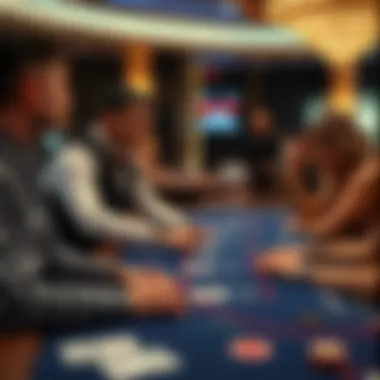
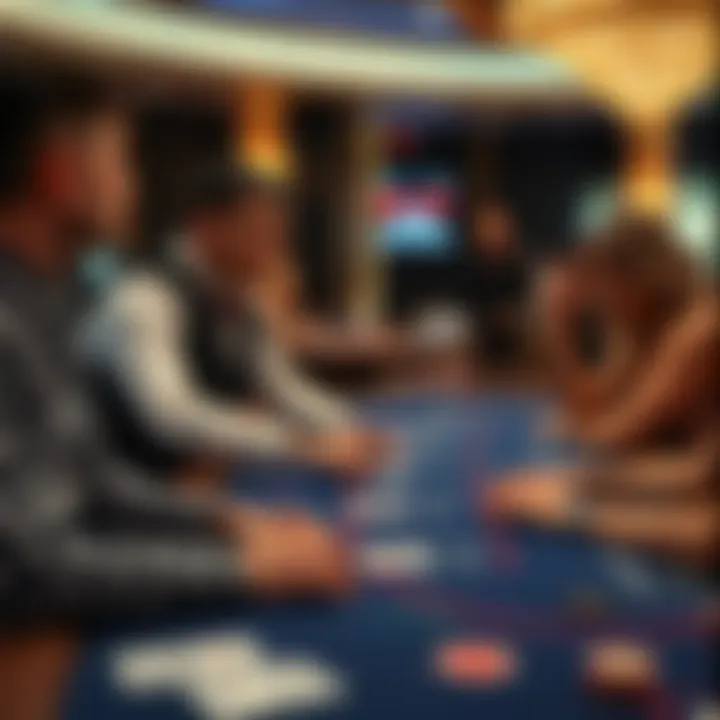
Answering Player Queries
As the face of the game, dealers are often the first point of contact for players' questions. Your ability to respond efficiently not only enhances player engagement but also can defuse any anxiety they might have about gameplay.
- Knowledge is Power: Being well-versed in the game’s rules, as well as common player strategies, allows you to provide accurate information readily. This increases your authority at the table. Players are more likely to return to a table where they feel their questions are valued and addressed correctly.
- Empathy in Communication: Some players may be new to the game, feeling overwhelmed by the pace or complexity of blackjack. Offering supportive answers can significantly improve their experience. Phrases like, "I understand it can be a bit tricky, let me break it down for you," can work wonders.
- Stay Calm and Professional: Even if a player is agitated or confused, maintaining a composed demeanor ensures the game maintains its flow. A dealer should respond to queries patiently, validating the player's concerns while guiding them through the rules.
Handling Disputes and Conflicts
Disputes are an unfortunate yet inevitable part of dealing blackjack. How a dealer navigates these emotional waters can determine whether tensions escalate or resolve smoothly.
- Recognizing the Source of Discontent: Understanding where a dispute stems from is essential. Whether it revolves around incorrect card distribution, misinterpretation of a rule, or bet disputes, recognizing the issue allows you to address it appropriately.
- Remain Neutral: As a dealer, your position is to be impartial. While it is essential to stand by house rules, becoming personally involved can complicate matters. Address the situation by referencing established protocols and facilitate a resolution that adheres to those rules.
- Going Up the Chain: In the case of an unresolved dispute, don’t hesitate to call for a floor manager. They hold the authority to resolve major conflicts, and involving them when necessary can help maintain the peace at the table.
By embracing these principles of rules and etiquette, blackjack dealers not only enhance their own professional standing but also elevate the overall gaming experience for everyone involved. Creating an atmosphere of trust, knowledge, and respect allows players to engage in the game fully, knowing they are in good hands.
Advanced Techniques in Dealing
In the world of blackjack, being a dealer is not merely about dealing cards or swapping chips. Advanced techniques in dealing form the backbone of effective gameplay and can significantly elevate the experience for both players and dealers alike. When employed correctly, these techniques can mean the difference between a mundane game and one that feels electric, full of engaging dynamics. Understanding advanced strategies is essential for enhancing not only your skillset but also the atmosphere at the table.
Card Counting Awareness
Card counting is a crucial concept every dealer should be aware of, even if they aren't the ones using it. This technique gives players a strategic edge by keeping track of the high and low cards that have been dealt. A skilled dealer must recognize the signs that suggest a player may be counting cards. If a player begins to bet heavily after a series of low cards, it may indicate they feel a change in the count has occurred.
It's critical for a dealer to remain composure while navigating this situation. Implementing a few strategies can work wonders:
- Stay Calm and Observant: Recognize behavioral changes; players may exhibit signs such as sudden increases in bets or more intense focus.
- Engage the Other Players: Shift attention away from the suspected card counter, chitchatting with other players can deflect suspicion.
- Rotate Decks: If you notice a player consistently winning, replacing the deck can shift the dynamics, putting players back on equal footing.
"In blackjack, the dealer is the guardian of fairness, yet also the protector of the game's spirit."
Adjusting to Player Skill Levels
Every player who sits at the blackjack table comes with unique abilities and strategies. As a dealer, it’s vital to adjust your dealing techniques to cater to these varying levels of skill. This means being adaptable and flexible in your approach. For example, when dealing with seasoned pros, you may find them having specific requests. In contrast, newcomers to the game might appreciate a more guided experience.
Some approaches for better adaptation include:
- Tailored Communication: Use language and terminology that fits the audience. Simplifying instructions for beginners and engaging in strategic conversations with experts keeps the game lively.
- Pace Management: New players may feel overwhelmed with a fast pace. Slowing down can help everyone, including the more experienced players, feel more at ease during gameplay.
- Observations and Adjustments: Watch how your players interact with each other and the game. Tailor your style to complement the dynamic you witness.
Creating a Positive Atmosphere
Dealer reputation often rests on the atmosphere they create at the table. It’s vital not only to deal cards but also to cultivate a welcoming and inclusive environment. This can lead to returning customers and improved player satisfaction. Adopting certain approaches can contribute to building that atmosphere:
- Maintain a Positive Demeanor: Even during long shifts, a simple smile can do wonders. A friendly approach often invites players to open up.
- Encourage Interaction: Promote conversation among players. This can help build camaraderie among them and keep spirits high.
- Be Fair and Just: Maintain game integrity. Players need to trust you, and any sign of favoritism may disrupt the atmosphere entirely.
The Impact of Technology on Dealing
In the realm of blackjack, technology has become a game-changer, enhancing both the dealer's experience and the player's interaction. Adapting to these technological advancements isn't just a trend; it's essential for thriving in a highly competitive environment. From automated gaming systems to sophisticated digital displays, these elements alter how blackjack is played and managed. Let's take a closer look.
Emergence of Automated Gaming Systems
Automated gaming systems are significantly altering the dynamics on the blackjack floor. These systems streamline operations by automating card shuffling and dealing, which not only increases efficiency but also minimizes human error. Dealers now have more time to focus on player relationships rather than monotonous tasks like shuffling. For instance, consider a casino where an automatic shuffling machine is employed; this can result in faster game rounds, ensuring players stay engaged and the table remains lively.
It's worth noting that while technology enhances efficiency, it also presents challenges. Some players may feel that automated processes lack the human touch, leading to a less personalized experience. Therefore, navigating the balance between automation and personal interaction is crucial.
Utilization of Digital Displays
Digital displays are rapidly becoming a staple at blackjack tables. These screens not only show current game statistics and rules but can enhance the gaming atmosphere through visual effects. They provide a clear view of bets and payouts, which can help in decision-making. Players appreciate transparency, and digital displays cater to this need effectively.
However, reliance on technology has its pitfalls. For instance, if a digital display malfunctions, it may cause confusion and disrupt the game flow. Hence, dealers must be adept at troubleshooting these systems to maintain game integrity and player satisfaction.
Adjusting to Changing Gaming Landscapes
The gaming landscape is perpetually changing, influenced by technological advancements. As online gaming grows, casinos must adapt to attract players who might otherwise choose to play from home. For dealers, this means embracing technology as a tool for enhancing the player experience both on the floor and through online platforms.
"Staying ahead of the curve is not just about using tech; it’s about understanding the players’ needs and the ever-changing environment of the casino world."
Dealers need training and development, focusing on how to leverage technology while maintaining their unique role within the game. This adaptability can involve learning how different software integrations work and how they influence gameplay dynamics. Keeping abreast of these changes ensures that dealers remain indispensable in an evolving landscape.
Training and Development for Dealers
Training and development play a pivotal role in shaping proficient blackjack dealers. The casino floor is much more than a place for wagers; it's an intricate dance of strategy, psychology, and service. A well-trained dealer not only controls the flow of the game but also enhances the overall experience for players. In this high-stakes environment, continuous learning is essential. Understanding new trends, techniques, and player expectations ensures dealers are always ahead of the curve.
Importance of Continuous Learning
The realm of blackjack is constantly evolving. Innovations in technology, shifts in player behavior, and updates to rules and regulations necessitate ongoing education. Continuous learning allows dealers to adapt and refine their skills. For instance, knowing how to handle new electronic betting systems or recognizing the subtle changes in player moods can significantly affect the game's atmosphere.
"To be a great dealer is to evolve with your players. The table is alive, and so should your skills be."
Additionally, the importance of professional development cannot be overstated. Engaging in workshops, seminars, and even online courses can unlock insights that improve both technical skills and soft skills—like communication and conflict resolution. A knowledgeable dealer stands as the bridge between the players and the casino, fostering trust and ensuring a fair game.
Resources for Skill Enhancement
There are myriad resources available for dealers eager to sharpen their skills. Some of the most effective include:
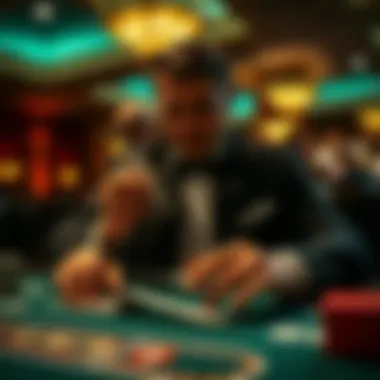

- Online Courses: Websites like Coursera and Udemy offer specific courses on casino dealing and game strategy, often taught by industry veterans.
- Books and Manuals: Reading materials that delve into the game mechanics can provide a deeper understanding of various strategies and statistics often overlooked in casual training.
- Networking with Other Dealers: Engaging in forums or attending dealer meet-ups can provide invaluable peer-to-peer learning. Websites such as Reddit and specialized Facebook groups offer platforms for discussions and sharing experiences.
- On-the-Job Training: Shadowing experienced colleagues is one of the best ways to learn the ins and outs of dealing. Observing their methods and incorporating them into one’s own technique can speed up the learning process significantly.
Mock Games and Experience Sharing
Participating in mock games is a stellar way to gain practical experience without the pressure of a real casino environment. These controlled settings allow dealers to practice their shuffling, dealing, and managing bets while receiving constructive feedback.
Further, sharing experiences with fellow dealers can lead to breakthroughs in understanding various game scenarios. It’s not uncommon for dealers to face irregular situations, and discussing these experiences can help develop strategies for managing unexpected challenges effectively.
Legal and Regulatory Considerations
In the world of casino gaming, understanding the legal and regulatory framework is paramount. For those involved in dealing blackjack, the nuances of these regulations influence the integrity of the game and the overall gaming experience. Not simply mere red tape, legal standards and guidelines help foster trust, ensuring that all players face a level playing field. This section delves into the key elements associated with legal considerations and their significance in the world of blackjack dealing.
Understanding Gambling Laws
Gambling laws vary significantly from one jurisdiction to another. It's crucial for dealers to stay informed about these laws to operate within legal boundaries. A clear grasp of the local gambling code safeguards both the casino and the dealer against potential legal repercussions.
Some fundamental aspects of gambling laws include:
- Licensing Requirements: Many jurisdictions mandate that casinos and their staff hold specific licenses to conduct operations. This often includes training and certifications.
- Age Restrictions: All players must be of legal gambling age, which can differ based on state or country regulations.
- Fair Play Standards: Laws that ensure games are fair and that casinos cannot manipulate outcomes should always be understood and adhered to.
Understanding these laws not only protects the dealer but also enhances the reputation of the establishment as a whole.
Dealer Certifications and Licenses
Obtaining the necessary certifications and licenses is another critical consideration for blackjack dealers. These documents verify the dealer’s knowledge of the game, rules, and regulatory requirements. The benefits of certification extend beyond legal compliance:
- Professional Credibility: Certified dealers tend to gain more respect from players, leading to a more professional atmosphere at the table.
- Enhanced Skills: Training and courses often involved in certification break down the complexities of blackjack, refining dealing skills.
- Job Security: Many casinos prefer or even require their dealers to have valid certifications, making jobs more accessible for those who invest in their education.
Dealers can acquire licenses and certifications through various state gaming commissions or approved training programs.
Compliance and Ethical Standards
Compliance goes hand-in-hand with understanding legal aspects in the gaming industry. Adhering to ethical standards isn't merely a formality—it's the bedrock of a trustworthy gaming environment. Establishing trust between the dealer and players fosters a positive experience for everyone at the table. Important points to keep in mind include:
- Transparency: Dealing must be conducted transparently, ensuring all players are made aware of the rules and any changes that occur during gameplay.
- Equal Treatment: All players, regardless of their experience or status, should be treated with equal respect and attention.
- Reporting Misconduct: It is crucial for dealers to report any suspicious activities or player misconduct to the appropriate authorities. This helps maintain the integrity of the game.
Compliance with legal and ethical standards ensures fairness and maintains the trust that is essential in any casino environment.
Best Practices for an Engaging Dealer Experience
In the world of blackjack, the dealer serves as the linchpin that holds the gaming experience together. A well-trained dealer can transform a standard game into a memorable event, fostering an environment where players feel comfortable and played well. Therefore, implementing best practices is crucial. Not only does it elevate the atmosphere at the table, but it also enhances the overall satisfaction for players, leading to repeat customers and a vibrant casino environment.
Maintaining Professionalism at the Table
Professionalism is the backbone of any successful dealer experience. A dealer must uphold an aura of authority and responsibility, which not only reassures players but also maintains the game's integrity. Here are some critical attributes of professionalism:
- Attire: Proper uniform adds to a dealer's credibility. Looking sharp reflects in one's demeanor and attitude.
- Behavior: Maintaining a calm and friendly demeanor can diffuse tense situations at the table. Whether it’s dealing with a win or a loss, a dealer's reaction can set the tone for the table.
- Game Knowledge: Being well-versed in the rules not only projects confidence but also facilitates smoother gameplay. This knowledge also enables the dealer to handle disputes or confusions effectively.
By emphasizing these elements, dealers can create a trustworthy atmosphere that invites players back for more engaging gameplay.
Fostering Player Engagement
Engagement goes hand in hand with interpersonal skills. After all, blackjack isn't just about the cards; it's also about the people. Here are some strategies that can be employed:
- Active Listening: Make sure to pay attention to what players say. A simple nod or a smile can help players feel acknowledged.
- Encouragement: Celebrate wins—big or small. A shout-out for a player hitting blackjack fosters a sense of camaraderie and excitement.
- Interactive Conversation: Chatting about the game, general topics, or even local events allows players to feel connected. Consider their backgrounds; different cultures might have unique ways of engaging.
In fostering engagement, dealers not only enhance player experience but also become part of the gambling community that players cherish.
Instilling a Sense of Community
Creating a sense of community at the table can be a game-changer. Players who feel like they're part of something larger are more likely to return. Here’s how to create that sense of belonging:
- Encourage Interaction: Allow players to talk among themselves, and maybe even facilitate conversations. A simple introduction can spark friendships.
- Themed Nights: Organizing events themed around holidays or local festivities can make the game more appealing. It transforms a casual night into an occasion.
- Feedback Loops: If a player expresses what they enjoy, take note and leverage that knowledge for future games. Asking for input can build loyalty and trust.
By implementing these practices, dealers not only improve the environment at their tables but also foster loyal patronage that can last for years.
Ultimately, the art of dealing blackjack transcends beyond just shuffling cards; it’s about crafting memorable experiences through professionalism, engagement, and community spirit.
For further reading on improving dealer interaction and engagement strategies, consider checking out resources such as Wikipedia on Blackjack, which offers insights into game dynamics.
End: The Evolving Role of the Blackjack Dealer
In the world of blackjack, the dealer embodies more than just a faceless entity managing the game. The role of the blackjack dealer has undergone significant changes, influenced by technology, player expectations, and industry standards. As we draw this article to a close, it's crucial to spotlight the evolving nature of this profession and its implications for both the game and the players involved.
Reflecting on Skills and Game Dynamics
As the card shuffle and the chips clink, a skilled dealer must navigate an array of responsibilities that extend beyond mere game management. The essence of being a blackjack dealer today involves a blend of technical card-handling skills, psychological acumen, and splendid communication prowess. Effective dealers are those who can balance the delicate dynamics between the players' moods and the mathematical strategy that fuels the game.
The intersection of these skills shapes the atmosphere at the blackjack table. A dealer’s ability to read the room, or perhaps more accurately, to feel the pulse of the players, can determine whether they’ll walk away ready for another hand or bitter from a loss. This empathy plays into a much broader narrative: fostering trust and confidence among players. By engaging players and ensuring they feel seen and valued, a dealer sets the tone for a more enjoyable gaming experience where participants are likely to return.
Moreover, with the rise of technology, the dealer’s role is reshaping right before our eyes. Automated dealing systems cannot yet match the nuanced interactions and intuition of a human dealer. The warmth of a smile or the ability to diffuse tension in a heated moment cannot be replicated by machines. Thus, despite technological advances, the human aspect remains irreplaceable.
The dealer must also be ever-learning, keeping pace with shifting regulations and player behavior trends. Engaging in continuous education about shifts in industry standards, betting technologies, and interaction techniques keeps a dealer relevant in an ever-changing gaming ecosystem.
Reflecting on this evolving role, it's evident that dealers hold a dual function: they uphold the integrity of the game while enhancing the social fabric of the casino environment. In essence, a good blackjack dealer is a guide, an entertainer, and a keeper of the rules, all rolled into one, making their role within the realm of blackjack not just important but fundamental.
"A dealer's strength lies not just in the cards they handle, but in the confidence they instill in their players."
As we part ways, remember that the evolution of the blackjack dealer is not just a tale of adaptation but a story of the rich interaction between humans and the games we love. Mastering these elements is not just beneficial for the dealer, but pivotal for the entire gambling experience. In the end, dealers who strive for excellence can transform a simple game into a series of unforgettable experiences.















